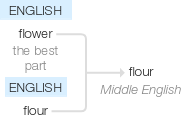Flour
Middle English: a specific use of flower in the sense ‘the best part’, used originally to mean ‘the finest quality of ground wheat’. The spelling flower remained in use alongside flour until the early 19th century.
wiktionary
Spelled (until about 1830) and meaning flower in the sense of flour being the "finest portion of ground grain" (compare French fleur de farine, fine fleur). Doublet of flower. Partially displaced native meal.
The U.S. standard of identity comes from 21CFR137.105.
etymonline
flour (n.)
"finer portion of ground grain," mid-13c., from flower (n.), and maintaining its older spelling, on the notion of flour as the "finest part" of meal, perhaps as the flower is the finest part of the plant or the fairest plant of the field (compare French fleur de farine), as distinguished from the coarser parts ( meal (n.2)). Old French flor also meant both "a flower, blossom" and "meal, fine flour." The English word also was spelled flower until flour became the accepted form c. 1830 to end confusion. Flour-knave "miller's helper" is from c. 1300.
flour (v.)
"to sprinkle with flour," 1650s, from flour (n.). Meaning "convert (wheat) into flour" is from 1828. Related: Floured; flouring.
